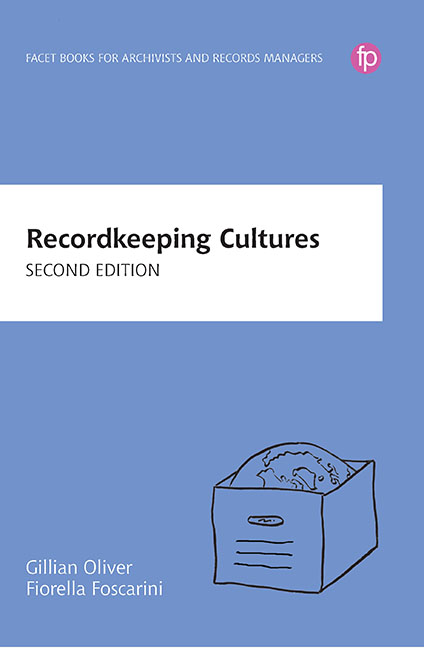2 - The Value Accorded to Records
Published online by Cambridge University Press: 28 October 2020
Summary
This chapter is the first of three that consider the level one factors of the ICF (see Figure 1.2). It deals with the area that can be the most daunting and is possibly the most challenging to tackle and to develop strategies for: the extent to which members of the organisation ‘respect records’; or, to put it another way, the extent to which people accept that it is desirable and necessary to manage information as evidence, for accountability purposes. This core value will be reflected in behaviours and attitudes, in resourcing and, ultimately, in the success of the records management programme.
The chapter begins by providing some background to explain the influences that shape this value. It then describes the likely manifestation of differing values towards information as evidence, as reflected in attitudes and behaviours, the recordkeeping infrastructure and IT usage. The next section suggests various methods to use in assessment, including observation, survey and/or interviews, and provides guidance to help select which options are appropriate in different organisational environments. The concluding section, on interventions, suggests ways to develop appropriate responses, which include taking what may be perceived as radically different approaches to traditionally accepted practices.
Cultural influences
The cultural influences that shape people's thinking about information as evidence, i.e. records, are many and varied. Organisational culture theory stresses that attention should be paid to layers of culture – e.g. national, occupational (or professional) and corporate. This has been explored at length in previous work (Oliver, 2011; Foscarini et al., 2013), and so the main points are just briefly summarised here. Organisations and the people who work in them do not exist in a vacuum, therefore it is incorrect to assume that ‘organisational culture’ is an easily discernible characteristic that can be neatly categorised as good or bad, strong or weak. The geographic location of the organisation will strongly influence the way things are done, not least because of the laws, regulations and standards that govern the workplace. The industry or sector to which the organisation belongs (e.g. banking, education, health) will offer similarities in terms of approaches to recordkeeping, understandings of its purpose and any ethical considerations attached to it.
- Type
- Chapter
- Information
- Recordkeeping Cultures , pp. 33 - 52Publisher: FacetPrint publication year: 2019



